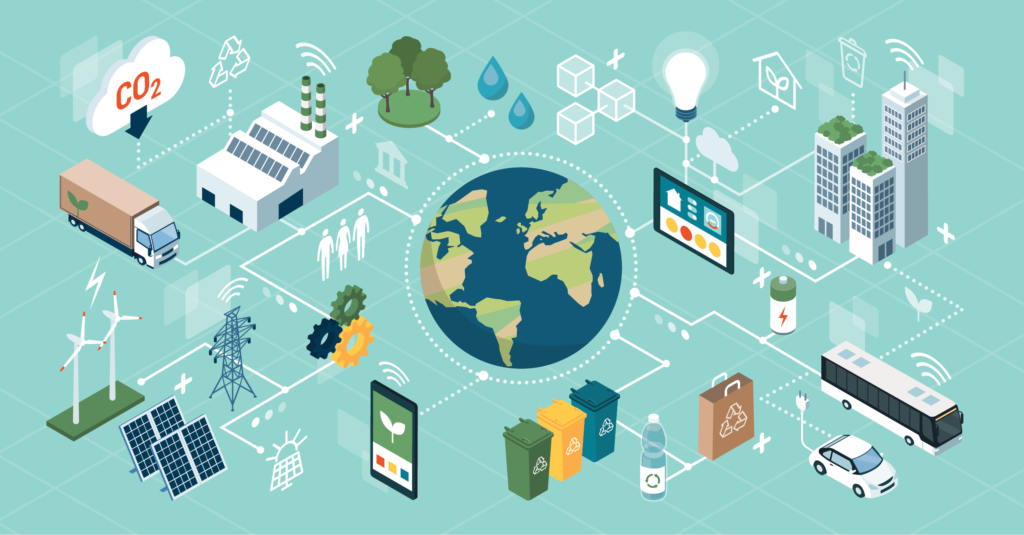Sustainability
Business and civil society can find effective ways to engage and shape the international agenda for climate change. CMI presents a short list of key international meetings and markers for 2021.

1. COP26 & Paris Climate Agreement
COP26 is scheduled to take place November. The annual meeting of parties to the Paris Agreement and the UN Framework Convention on Climate Change (UNFCCC) will bring governments together to develop new Nationally Determined Contributions (NDCs) that show increased ambition; create strategies to reach net-zero emissions by 2050; adopt adaption and resilience measures; and define climate finance commitments. With the U.S. acting to rejoining the Paris Agreement on President Biden’s first day in office, there is likely to be increased attention on U.S. positions at the climate conference. COP26 hosts, the United Kingdom and Italy, have encouraged companies to participate in a “Race to Zero” campaign and convened a Climate and Development Ministerial on March 31st in preparation for COP26, focused on increased access and transparency to climate finance, responses to climate impact, and creating the fiscal space for countries to recover from the economic shocks of COVID-19.
2. Leaders Summit on Climate April 2021
40 world leaders convened for a climate summit at the invitation of the Biden Administration from April 22-23. White House objectives for the Summit included: galvanizing global efforts to reduce carbon emissions; mobilizing public and private sector finance to drive the net-zero transition; examining the economic benefits of climate action, with a focus on job creation; spurring transformational technologies that can help reduce emissions; showcasing subnational and non-state actors that are committed to green recovery; and addressing the global security challenges posed by climate change.
Leaders used the climate summit to announce climate commitments, including:
President Xi Jinping re-stating China “strive[s] to peak” emissions by the end of this decade and reach carbon neutrality by 2060;
Prime Minister Trudeau pledging Canada would reduce its greenhouse emissions levels 40-45% from 2005 levels by 2030;
Prime Minister Yoshihide Suga announcing that Japan would cut emissions 46% below 2013 levels by the end of the decade; and
President Biden announcing that the U.S. would cut its emissions in half from 2005 levels by 2030.
A day before the Summit, the European Union reached a tentative climate deal to put the 27-nation bloc on a path to being “climate neutral” by 2050.
3. Asia-Pacific Economic Cooperation (APEC)
As APEC host for 2021, New Zealand identified “Increasing Inclusion and Sustainability for Recovery” as a key priority for the year, which includes developing measures to incentivize sustainability, supporting a green recovery, and tackling climate change. Within this context, New Zealand has expressed interest in promoting the use of renewable energy, updating the APEC environmental goods list, and facilitating trade in environmental services during its host year. APEC will provide New Zealand and other like-minded economies to foster collaboration in the Asia-Pacific on mutual climate priorities that includes government, private sector, and civil society stakeholders. Companies involved in the trade of environmental goods and services should consider how to engage in these discussions effectively and how the outcomes of negotiations could impact their businesses.
4. G7/G20
The G7 and G20 meetings will engage the world’s largest economies around global challenges, including climate change, in the context of speeding a global recovery from the pandemic. In February, the G7 released a joint statement which vowed to put “global ambitions on climate” as a priority, and the G20 Finance Ministers’ Meeting agenda included addressing the impact of climate change on the financial system. The G20 Environment Ministers’ Meeting, which will take place in July 2021, has noted a keen focus on a transition towards renewable energies, a green recovery, and modern, “smart” cities. In the U.S., President Biden’s January 23rd executive order, “Tackling the Climate Crisis at Home and Abroad” highlights U.S. intent to press its climate ambition across a range of international fora, including the G7 and G20. The U.S. and China will co-chair a G20 study group focused on climate-related financial risks.
5. World Trade Organization (WTO)
The new WTO Director-General (DG), Ngozi Okonjo-Iweala, has publicly announced an “extensive and serious reform” effort within the international organization, which includes looking at climate change. She has stated “global trade can…tackle climate change and restore faith in the system of cooperation that has faltered in recent years.” DG Okonjo-Iweala’s announcement provides an opportunity for global economies to engage with the WTO and shape the climate and trade discussion that is occurring from the top-down as well as the bottom-up – particularly through the Committee on Trade and Environment. The U.S. recently pledged to participate in the Structured Discussions on Trade and Environmental Sustainability, which will include working on “deliverables” of environmental sustainability in the various areas of the WTO, among other tasks. While the WTO has struggled as a negotiating platform in recent years, it can set the tone globally and is likely to serve as a platform for idea sharing, policy dialogues, and debates at the intersection of climate and trade rules.